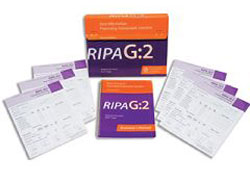Description
The RIPA-Geriatric: 2nd edition is a comprehensive assessment battery designed to identify, describe, and quantify cognitive-linguistic deficits in the geriatric population. Speech-language pathologists, neuropsychologists, psychologists, and other rehabilitation professionals can use the test. The RIPA-G:2 subtests assess most aspects of geriatric cognitive-linguistic functioning: Immediate Memory, Temporal Orientation, Spatial Orientation, General Information, Situational Knowledge, Categorical Vocabulary, and Listening Comprehension.
The RIPA-G:2 was normed on 229 individuals from 55 to 97 years old, matched to the prevalence of cognitive disorders in the elderly population and including both normally functioning adults and those with mild cognitive impairment, mild to moderate Alzheimer's disease, right cerebrovascular accident, and traumatic brain injury. Statistical analysis indicated consistently high reliability and validity.
Administration and Scoring
The battery takes about 30 minutes to complete. Raw scores yield subtest scaled scores, percentile ranks, an Information Processing Index, a degree of severity, and a Diacritical Scores Summary.
